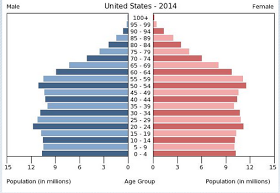Take a second to look at these charts and think about the implications. As a 52 year-old female, I fit into the largest age demographic in the US, but I'm well on my way to obscurity here in Cambodia. The 20-24 group rules here. Simple observations tell me that most Cambodians are younger than I, but the exact proportions on the chart are astonishing. Ou Virak puts it plainly: "Cambodia is one of the youngest countries in the world."
Many travellers come to Cambodia with an awareness of the Khmer Rouge history; they visit the Toul Sleng Prison Museum and the Choeung Ek (killing fields) Memorial. The Flicks shows The Killing Fields -- the 1984 film -- every week at their riverside location (the tourist area), and nearly every show sells out.
Here's what Ou Virak has to say about the relevance of this genocide to today's young Khmers:
...the majority of Cambodians were born after the Khmer Rouge fell from power. Most of the electorate has no memory of the killing fields.... This also explains the resentment most young Cambodians feel at the way their country is portrayed in the global media. Everybody in Cambodia knows of someone who died during the three years of Khmer Rouge rule, but most of the country's population has never met any of them. For most Cambodians the killing fields belong to the past that rarely seems relevant to them or to the problems the country faces today. But when the rest of the world looks at Cambodia, they see nothing but the killing fields.For many years, we saw the following slogan on web sites promoting travel to Cambodia's neighbouring country: "Vietnam: We're a country, not a war!" And of course Cambodia is more than killing fields and Angkor Wat. It disturbs me deeply, though, that a majority of Cambodians is dismissing a horrific historical period as both an aberration and a tourist attraction. I have no idea what, if any, history is taught in schools here, but I suspect it's minimal.
If they see no connection between the rise of the Khmer Rouge in 1974 and the one-man rule in Cambodia in 2014, how can these young citizens understand the dangers of complacency?



Thank you for the eye-opening post, Amanda.
ReplyDeleteFor many years, the same was said of young Malaysians. That we have no context for history and the significance of independence from colonial rule. That we are indolent, complacent and uninterested in politics. How could we show an interest in politics, when the University & University Colleges Act hangs constantly above our heads like a Sword of Damocles? How could we appreciate the significance of nation-builders of different faiths and ethnicities when the public education system here has so successfully managed to erase them from history? In the 1990s, the country's scholars and leaders lamented the fact that in 10 - 20 years, there will be no young Malaysian of calibre with the potential to lead the country. However, in the last 10 years, thanks to social media, we have seen a huge spike in awareness of political issues and Malaysian history, especially among the young. Young Malaysians have become increasingly politically aware, active and vocal. Gone is the ennui, apathy and ignorance of the youth of the '90s. What we have now is a generation of youth willing to get involved and get hands-on in the nation-building process, who are not afraid of standing up for their beliefs, not afraid of being persecuted for speaking the truth. So take heart, Cambodia is a young country, that's true, and that only means it has lots of potential to grow and mature.